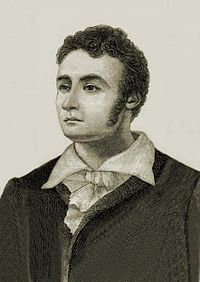
Alexandre Guiraud
Encyclopedia

France
The French Republic , The French Republic , The French Republic , (commonly known as France , is a unitary semi-presidential republic in Western Europe with several overseas territories and islands located on other continents and in the Indian, Pacific, and Atlantic oceans. Metropolitan France...
poet, dramatic author and novelist.
Biography
Guiraud was born in LimouxLimoux
Limoux is a commune and subprefecture in the Aude department, a part of the ancient Languedoc province and the present-day Languedoc-Roussillon region in southern France...
, Aude
Aude
Aude is a department in south-central France named after the river Aude. The local council also calls the department "Cathar Country".Aude is also a frequent feminine French given name in Francophone countries, deriving initially from Aude or Oda, a wife of Bertrand, Duke of Aquitaine, and mother...
, the son of a rich cloth merchant. He studied at the École de droit de Toulouse
Toulouse
Toulouse is a city in the Haute-Garonne department in southwestern FranceIt lies on the banks of the River Garonne, 590 km away from Paris and half-way between the Atlantic Ocean and the Mediterranean Sea...
where he created a "Gymnase littéraire". He made frequent trips to Paris where the success of his poetry opened the doors to the Académie française
Académie française
L'Académie française , also called the French Academy, is the pre-eminent French learned body on matters pertaining to the French language. The Académie was officially established in 1635 by Cardinal Richelieu, the chief minister to King Louis XIII. Suppressed in 1793 during the French Revolution,...
to which he was elected against Alphonse de Lamartine
Alphonse de Lamartine
Alphonse Marie Louis de Prat de Lamartine was a French writer, poet and politician who was instrumental in the foundation of the Second Republic.-Career:...
in 1826. He was named by Baron Charles X
Charles X of France
Charles X was known for most of his life as the Comte d'Artois before he reigned as King of France and of Navarre from 16 September 1824 until 2 August 1830. A younger brother to Kings Louis XVI and Louis XVIII, he supported the latter in exile and eventually succeeded him...
in 1827 in reward for his contribution to the opera Pharamond. He was the author of many elegiac
Elegiac
Elegiac refers either to those compositions that are like elegies or to a specific poetic meter used in Classical elegies. The Classical elegiac meter has two lines, making it a couplet: a line of dactylic hexameter, followed by a line of dactylic pentameter...
poems as well as tragedies
Tragedy
Tragedy is a form of art based on human suffering that offers its audience pleasure. While most cultures have developed forms that provoke this paradoxical response, tragedy refers to a specific tradition of drama that has played a unique and important role historically in the self-definition of...
and novel
Novel
A novel is a book of long narrative in literary prose. The genre has historical roots both in the fields of the medieval and early modern romance and in the tradition of the novella. The latter supplied the present generic term in the late 18th century....
s. He died in Paris
Paris
Paris is the capital and largest city in France, situated on the river Seine, in northern France, at the heart of the Île-de-France region...
.
Works
- Élégies savoyardes (1822)
- Les Machabées, ou le Martyre, tragédie en 5 actes, Paris, Théâtre de l'Odéon, 14 June 1822
- Le Comte Julien, ou l'Expiation, tragédie en 5 actes, Paris, Théâtre de l'Odéon, 12 April 1823
- Cadix ou la délivrance de l'Espagne (1823)
- Chants hellènes, Byron, Ipsara (1824)
- Poèmes et chants élégiaques (1824)
- Pharamond, poème de MM. Ancelot, Guiraud, et Soumet, musique de MM. Boieldieu, Berton et Kreutzer, Paris, Académie royale de musiqueAcadémie Royale de MusiqueThe Salle Le Peletier was the home of the Paris Opera from 1821 until the building was destroyed by fire in 1873. The theatre was designed and constructed by the architect François Debret on the site of the former Hôtel de Choiseul...
, 10 June 1825 - Le Prêtre (1826)
- Virginie, tragédie en 5 actes et en vers, Paris, Théâtre-Français, 28 April 1827
- Césaire, révélation (2 vol.) (1830)
- La Communion du duc de Bordeaux (1832)
- Les Deux Princes (1832)
- De la Vérité dans le système représentatif (1834)
- Flavien, ou De Rome au désert (3 vol.) (1835)
- Poésies dédiées à la jeunesse (1836)
- Philosophie catholique de l'histoire, ou l'Histoire expliquée ; introduction renfermant l'histoire de la création universelle (3 vol.) (1839-41)
- Le Cloître de Villemartin, poésie (1843)
- Œuvres complètes (4 vol.) (1845)

